
Unlocking Wisdom: The Power of Proverbs Worksheets in Education
Proverbs, those pithy, traditional sayings that express a perceived truth based on common sense or experience, are the linguistic DNA of cultures worldwide. From "When in Rome, do as the Romans do" to "A stitch in time saves nine," these nuggets of wisdom encapsulate centuries of human observation, values, and practical advice. While their inherent wisdom is undeniable, teaching proverbs effectively in a classroom setting can be a nuanced challenge. How do educators transform abstract sayings into tangible learning experiences? The answer, increasingly, lies in the strategic use of proverbs worksheets. These versatile educational tools serve as bridges, connecting students to linguistic richness, cultural understanding, and critical thinking skills in a structured and engaging manner.
This comprehensive article delves into the profound value of incorporating proverbs into education, explores the multifaceted design of effective proverbs worksheets, and highlights the myriad benefits they offer to students across various age groups and academic disciplines.
The Enduring Value of Proverbs in Education

Before diving into the specifics of worksheets, it’s crucial to understand why proverbs hold such an important place in the curriculum:
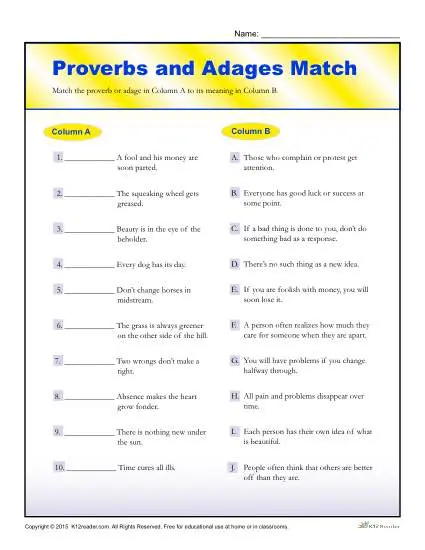
- Cultural Literacy: Proverbs are windows into a culture’s soul. They reveal historical contexts, societal norms, and deeply held beliefs. Understanding a culture’s proverbs is akin to understanding its collective consciousness.
- Linguistic Development: Proverbs are a rich source of vocabulary, idiomatic expressions, and sophisticated sentence structures. They expose students to figurative language, metaphors, and the nuances of meaning, thereby enhancing their overall linguistic proficiency and comprehension of complex texts.
- Critical Thinking Skills: Interpreting proverbs requires more than rote memorization. Students must analyze, infer, and apply abstract concepts to real-world situations, fostering higher-order thinking.
- Moral and Ethical Reasoning: Many proverbs convey moral lessons, ethical guidelines, or practical life advice. Discussing them provides a safe space for students to explore values, consequences, and personal responsibility.
- Cross-Curricular Relevance: Proverbs can be integrated into English Language Arts (ELA), history, social studies, philosophy, and even science lessons, making them a remarkably flexible teaching resource.
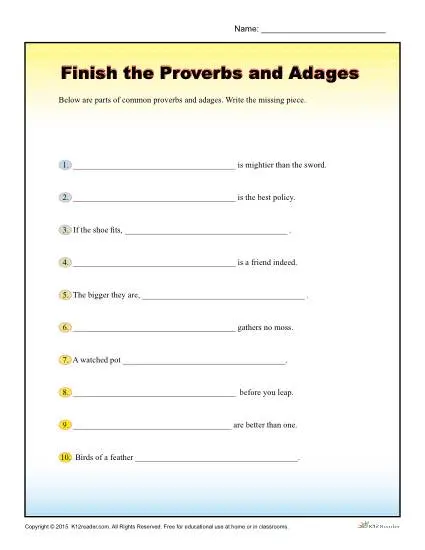

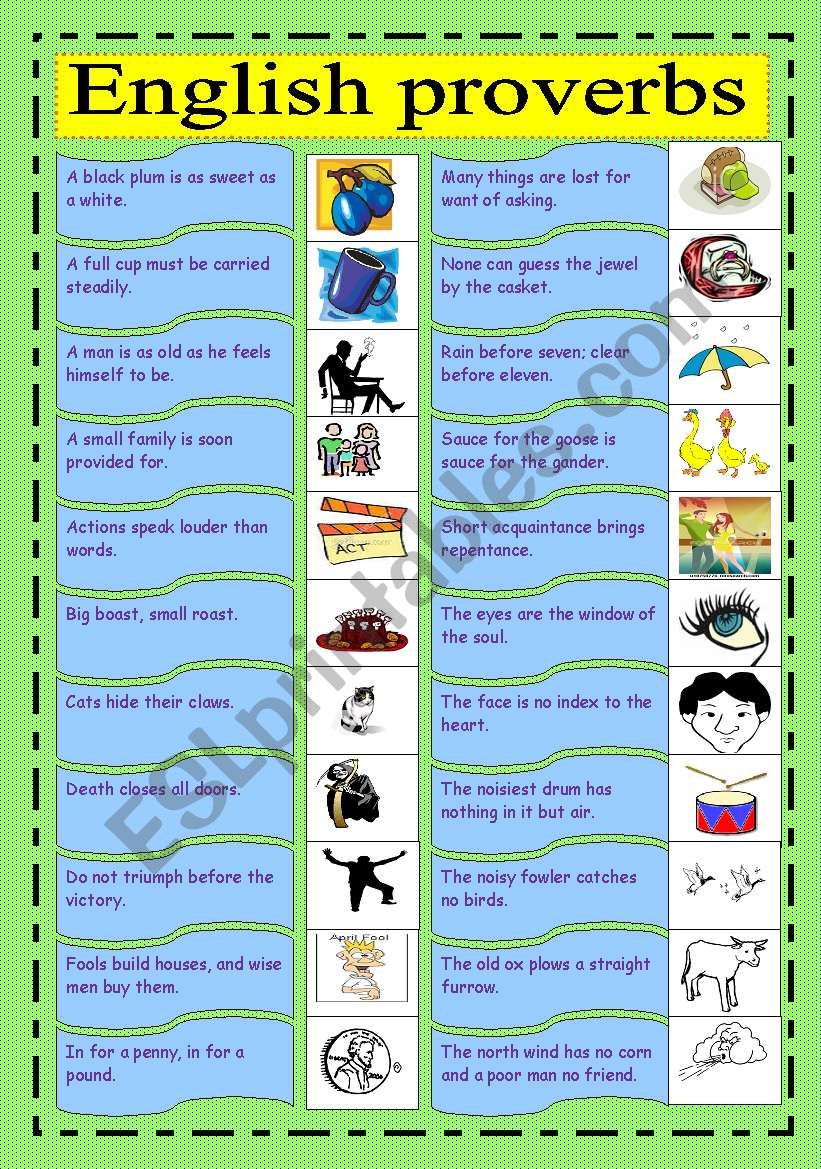
What Are Proverbs Worksheets and Why Are They Essential?
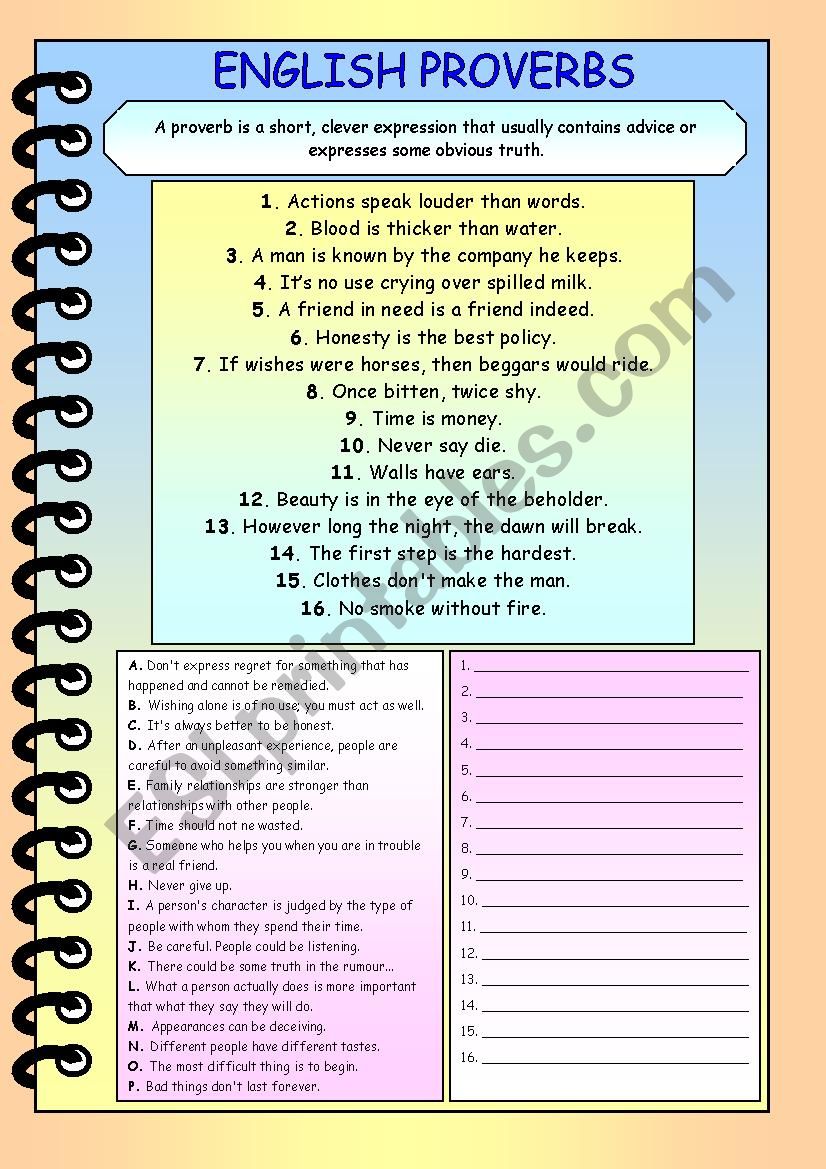
At their core, proverbs worksheets are structured educational materials designed to facilitate the learning, comprehension, and application of proverbs. They transform the often abstract nature of these sayings into concrete, manageable activities that cater to diverse learning styles. Their essential nature stems from several pedagogical advantages:
- Active Learning: Unlike passive listening, worksheets demand active engagement, requiring students to think, write, and interact with the material.
- Reinforcement and Retention: Repetitive, varied exercises help solidify understanding and improve long-term memory of proverbs and their meanings.
- Assessment Tool: Worksheets provide educators with a tangible way to assess student comprehension and identify areas where further instruction may be needed.
- Differentiated Instruction: They can be easily adapted to suit different proficiency levels, from simple matching activities for beginners to complex analytical tasks for advanced learners.
- Independent Practice: Worksheets empower students to work independently, fostering self-reliance and reinforcing concepts at their own pace.

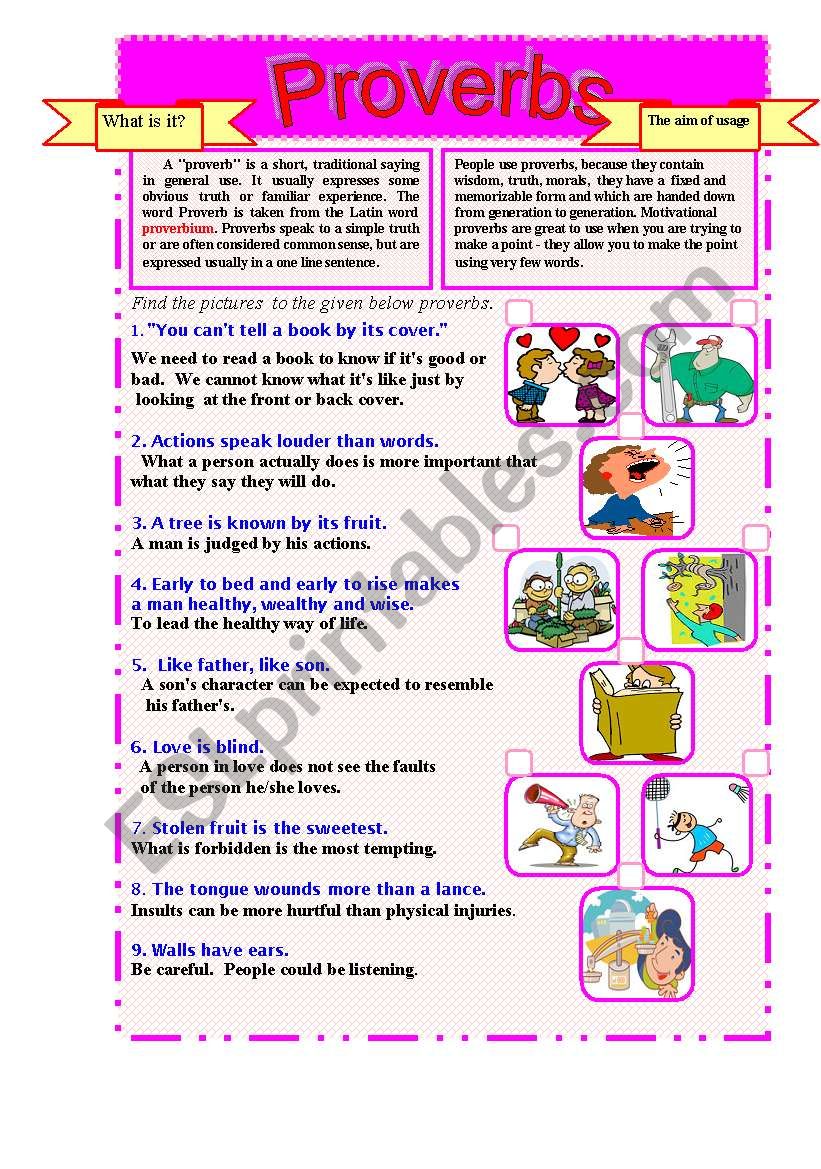

Diverse Activities Found on Proverbs Worksheets
The effectiveness of proverbs worksheets lies in their variety. A well-designed worksheet set will offer a range of activities that progressively build understanding and encourage deeper engagement. Here are some common and effective activity types:
- Matching Proverbs to Meanings: This is often the foundational activity, especially for younger learners or those new to proverbs. Students are given a list of proverbs and a corresponding list of their meanings, and they must draw lines or write numbers to connect them correctly. Example: "Look before you leap" -> "Think carefully before you act."
- Fill-in-the-Blank Proverbs: This activity helps students remember the exact wording of common proverbs. A proverb is presented with one or more key words missing, and students must complete it. Example: "An apple a day keeps the _____ away."
- Explanation and Interpretation: This moves beyond simple recall. Students are given a proverb and asked to explain its meaning in their own words. This encourages critical thinking and demonstrates true comprehension. For advanced learners, they might be asked to discuss the origin or cultural context of a proverb.
- Scenario Application: A powerful way to assess understanding is to provide short scenarios or dilemmas and ask students which proverb best applies to the situation, or how a particular proverb might guide someone in that scenario. Example: "Sarah spent all night cramming for her test, but then she forgot everything she studied the next day. Which proverb applies here?" (Possible answer: "Haste makes waste" or "Slow and steady wins the race" if contrasted with effective study habits).
- Creative Writing Prompts: Students are asked to write a short story, a dialogue, or a paragraph that illustrates the meaning of a given proverb. This encourages imaginative thinking and reinforces the proverb’s practical application.
- Discussion Questions: Worksheets can include open-ended questions designed to spark classroom discussion or individual reflection. These might ask students to agree or disagree with a proverb, provide personal examples, or compare proverbs from different cultures.
- Picture Association: For visual learners, providing images that represent a proverb’s meaning (either literally or metaphorically) and asking students to match them to the correct proverb can be highly effective.
- Multiple Choice Questions: Similar to matching, but with distractors, these questions can test understanding of meaning or the correct completion of a proverb.
- Sentence Construction: Students are given a proverb and asked to use it correctly in a new sentence, demonstrating their ability to integrate it into their own language.
- Proverb Puzzles (Crosswords, Word Searches): These can be fun, lighthearted ways to reinforce vocabulary and proverb recognition, often used as warm-ups or cool-downs.
Pedagogical Benefits of Utilizing Proverbs Worksheets
Beyond the general advantages of active learning, the specific design of proverbs worksheets yields several distinct pedagogical benefits:
- Deepening Linguistic Nuance: Students learn that words can have both literal and figurative meanings, improving their ability to decode complex texts and appreciate literary devices.
- Enhancing Cultural Competence: Exposure to proverbs from various cultures fosters empathy and understanding of diverse perspectives, preparing students for an interconnected world.
- Promoting Problem-Solving Skills: By applying proverbs to scenarios, students develop practical problem-solving abilities and learn to think about consequences and wise decision-making.
- Boosting Vocabulary and Idiom Acquisition: Worksheets systematically introduce new vocabulary and common idioms, expanding students’ expressive and receptive language skills.
- Facilitating Differentiation: Educators can easily select or create worksheets tailored to different learning paces and proficiencies, ensuring all students are appropriately challenged and supported.
Crafting Effective Proverbs Worksheets: A Guide for Educators
Designing impactful proverbs worksheets requires thoughtful consideration:
- Age-Appropriateness: Select proverbs that are relatable and comprehensible for the target age group. Younger children might start with simple, concrete proverbs ("A rolling stone gathers no moss"), while older students can tackle more abstract or historically significant ones.
- Clarity and Simplicity: Instructions should be clear, concise, and easy to follow. The layout should be uncluttered and visually appealing.
- Variety of Activities: As discussed, incorporating different activity types keeps students engaged and caters to various learning styles.
- Real-World Connection: Whenever possible, connect proverbs to real-life situations, current events, or personal experiences to make them more relevant and memorable.
- Cultural Sensitivity: When introducing proverbs from different cultures, provide adequate context and ensure they are presented respectfully.
- Inclusion of Answer Keys: For self-correction or quick grading, an answer key is invaluable.
- Scaffolding: Start with simpler tasks (matching, fill-in-the-blank) and gradually move towards more complex ones (interpretation, application, creative writing).
- Integration with Other Resources: Worksheets can be used in conjunction with discussions, video clips, storytelling, or interactive online tools to create a richer learning experience.
Integrating Proverbs Worksheets Across the Curriculum
The versatility of proverbs worksheets makes them an excellent tool for cross-curricular integration:
- English Language Arts (ELA): Ideal for vocabulary building, understanding figurative language, reading comprehension, writing prompts, and analyzing literary themes.
- Social Studies/History: Explore proverbs that emerged from specific historical periods or cultural movements to understand societal values and historical context.
- Ethics and Philosophy: Use proverbs as springboards for discussions on moral dilemmas, character development, and different philosophical viewpoints.
- ESL/EFL Classes: Proverbs are essential for non-native speakers to achieve fluency and cultural immersion, as they are frequently used in everyday conversation and media. Worksheets help demystify these often challenging idiomatic expressions.
- Psychology: Examine proverbs through a psychological lens, discussing human behavior, decision-making, and coping mechanisms.
Addressing Challenges and Embracing Digital Solutions
While proverbs worksheets are highly beneficial, educators might encounter challenges. Some proverbs can be archaic, culturally specific, or difficult to interpret without context. The solution lies in providing ample background information, facilitating open discussions, and encouraging students to share their own interpretations and relevant experiences.
In the digital age, the concept of proverbs worksheets has evolved. Online platforms offer interactive versions, complete with instant feedback, multimedia elements, and gamified experiences. Digital resources allow for easy customization, sharing, and access to a vast array of proverbs from around the globe. Teachers can utilize online worksheet generators, interactive quizzes, and collaborative documents to create dynamic learning environments that transcend traditional paper-based activities. This digital transformation further amplifies the reach and impact of proverb education.
Conclusion
Proverbs are more than just old sayings; they are timeless capsules of wisdom, linguistic treasures, and cultural markers. In an educational landscape that increasingly values critical thinking, cultural literacy, and effective communication, the role of proverbs is more vital than ever. Proverbs worksheets, in their diverse forms, stand out as indispensable tools for educators. They provide the structure, engagement, and reinforcement necessary to unlock the profound meanings embedded within these concise expressions, transforming abstract wisdom into concrete understanding.
By actively engaging students with proverbs through well-designed worksheets, educators not only enrich their vocabulary and linguistic skills but also cultivate their ability to think critically, understand diverse cultures, and navigate the complexities of life with greater insight. The legacy of proverbs, passed down through generations, continues to shape our understanding of the world, and through the power of thoughtfully crafted worksheets, this invaluable wisdom can be effectively transmitted to the minds of future generations.
